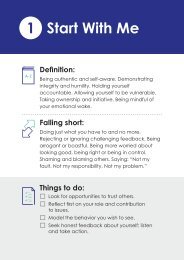Expedia Group Trust Behaviour
Create successful ePaper yourself
Turn your PDF publications into a flip-book with our unique Google optimized e-Paper software.
<strong>Trust</strong> <strong>Behaviour</strong>
1 Start With Me<br />
Definition:<br />
Being authentic and self-aware. Demonstrating<br />
integrity and humility. Holding yourself<br />
accountable. Allowing yourself to be vulnerable.<br />
Taking ownership and initiative. Being mindful of<br />
your emotional wake.<br />
Falling short:<br />
Doing just what you have to and no more.<br />
Rejecting or ignoring challenging feedback. Being<br />
arrogant or boastful. Being more worried about<br />
looking good, being right or being in control.<br />
Shaming and blaming others. Saying: “Not my<br />
fault. Not my responsibility. Not my problem.”<br />
Things to do:<br />
o Look for opportunities to trust others.<br />
o Reflect first on your role and contribution<br />
to issues.<br />
o Model the behavior you wish to see.<br />
o Seek honest feedback about yourself; listen<br />
and take action.
2 <strong>Trust</strong> Others<br />
Definition:<br />
Assuming positive intent. Being willing to extend<br />
trust first. Using your best judgment when first<br />
investing trust. Once established, wholeheartedly<br />
trusting others.<br />
Falling short:<br />
Starting from a place of distrust. Only allowing<br />
yourself to trust when the risks are low.<br />
Pretending to trust and then second-guessing.<br />
Micromanaging or being a ‘helicopter manager’.<br />
Saying: “They have to prove themselves first. It’s<br />
safer doing it myself.”<br />
Things to do:<br />
o Look for opportunities to trust others.<br />
o Be the first to offer trust.<br />
o Be transparent when you extend trust.<br />
o Empower others to make decisions.<br />
o Delegate (tasks, authority, idea generation).
3<br />
Develop<br />
Relationships<br />
Definition:<br />
Building rapport with others. Valuing the relationship<br />
and not just what you can get out of it. Putting team<br />
interest ahead of self-interest; contributing to team<br />
success. Genuinely caring about people.<br />
Falling short:<br />
Breaking confidences. Talking behind other<br />
people’s backs. Being two-faced. Burning bridges.<br />
Keeping others at a distance. Saying: “I’m not here<br />
to make friends.”<br />
Things to do:<br />
o Reach out just to check in.<br />
o Make time for face-to-face interaction, live<br />
or virtual.<br />
o Find a personal connection or common interest.<br />
o Perform a simple act of caring.<br />
o Share a meal or drink.
4 Be Transparent<br />
Definition:<br />
Communicating openly and honestly; saying<br />
what you mean and meaning what you say. Not<br />
being afraid to ask for help. Clearly stating your<br />
intent. Living your values.<br />
Falling short:<br />
Censoring difficult messages for fear of the<br />
emotions involved. Fostering hidden agendas.<br />
Telling people what they want to hear, or holding<br />
back what needs to be said. Hoarding information.<br />
Hiding behind or manipulating the numbers.<br />
Talking loudly but saying nothing.<br />
Things to do:<br />
o Allow yourself to be vulnerable.<br />
o Let people know where you stand.<br />
o Create and share group norms openly.<br />
o Be honest about what you can or<br />
cannot share.<br />
o Explain the ‘why’.
5 Show Respect<br />
Definition:<br />
Honoring diverse ideas, views and cultures. Being<br />
actively interested in the success of others. Treating<br />
others as you want to be treated. Talking about<br />
others as though they are in the room.<br />
Falling short:<br />
Faking respect, concern or loyalty. Showing<br />
respect only to those who can benefit you. Taking<br />
credit for the success of others. Interrupting and<br />
undermining. Bad-mouthing or belittling.<br />
Things to do:<br />
o Treat everyone with respect, regardless of<br />
their role/relationship to you.<br />
o Celebrate and champion the success<br />
of others.<br />
o Invite and respect divergent views.<br />
o Keep confidences.<br />
o Give others credit.
6<br />
Seek Mutual<br />
Understanding<br />
Definition:<br />
Listening to the perspective of others and clarifying<br />
meaning before responding. Confirming everyone<br />
is on the same page. Being able to restate an<br />
opposing opinion, even when you disagree.<br />
Welcoming different thoughts and opinions.<br />
Valuing curiosity.<br />
Falling short:<br />
Putting the responsibility on others to ask questions<br />
and seek clarification. Failing to take your<br />
audience into account. Failing to listen or halflistening.<br />
Making assumptions. Just waiting for your<br />
turn to talk.<br />
Things to do:<br />
o Empathize with your audience and tailor your<br />
message accordingly.<br />
o Invite others to speak, respond, contribute.<br />
o Paraphrase back/ask others to paraphrase back.<br />
o Ask probing questions.<br />
o If you don’t know something, ask.
7 Face Reality<br />
Definition:<br />
Recognizing the human element. Having the<br />
courage to face the truth. Addressing what’s really<br />
going on beneath the surface. Accepting that noone<br />
has all the answers. Stepping up and having<br />
the difficult conversations.<br />
Falling short:<br />
Delaying or putting off an action because it’s<br />
difficult. Being too direct and not considering your<br />
impact on others. Avoiding an unpleasant truth.<br />
Ignoring the warning signs. Lacking self-awareness.<br />
Shooting the messenger.<br />
Things to do:<br />
o Confront, surface and resolve issues quickly.<br />
o Appreciate and act upon the feedback<br />
you receive.<br />
o Use data to guide but not define your actions.
8 Make Amends<br />
Definition:<br />
Resolving problems without being asked. Being<br />
quick to recognize and own your mistakes. Being<br />
willing to forgive and set things right. Being humble.<br />
Falling short:<br />
Not addressing issues/problems unless<br />
confronted or forced. Trying to justify or deny<br />
wrongdoing. Avoiding the tough stuff. Covering<br />
up mistakes. Being defensive. Saying: “That’s their<br />
mistake, not mine! I don’t own that.”<br />
Things to do:<br />
o Be the first to take responsibility or say<br />
“I’m sorry”.<br />
o Be the one to extend the olive branch.<br />
o Find common ground and seek<br />
equitable outcomes.<br />
o Resolve conflict with minimal noise.
9<br />
Keep<br />
Commitments<br />
Definition:<br />
Demonstrating your word is your bond. Priding<br />
yourself on keeping commitments. Setting clear<br />
expectations then delivering as promised. Being<br />
reliable and dependable. Following through.<br />
Falling short:<br />
Going dark if issues arise. Promising things you<br />
can’t deliver. Making loose commitments you can<br />
back out of. Avoiding commitment altogether.<br />
Things to do:<br />
o Before committing, clarify expectations;<br />
yours and theirs.<br />
o Set milestones, then consistently track and<br />
communicate progress.<br />
o Enroll others early and delegate effectively.<br />
o Surface issues quickly and ask for help<br />
if needed.
10 Produce Results<br />
Definition:<br />
Striving to exceed expectations. Taking the<br />
initiative to make things better. Consistently seeing<br />
things through to completion. Moving quickly;<br />
making mistakes and constantly improving.<br />
Adding business value. Remembering the ‘how’<br />
is as important as the ‘what’.<br />
Falling short:<br />
Keeping busy without clear purpose. Meeting<br />
only the minimum requirements or expectations.<br />
Failing to produce. Making excuses for poor results.<br />
Saying: “The dog ate my homework.”<br />
Things to do:<br />
o Set targets that are challenging but attainable.<br />
o Continuously course correct; prioritize and<br />
re-prioritize to stay aligned with business needs.<br />
o Create a culture that celebrates milestones<br />
and tasks accomplished.<br />
o Value mistakes as learning opportunities.
TM<br />
TRPC01C-EN




